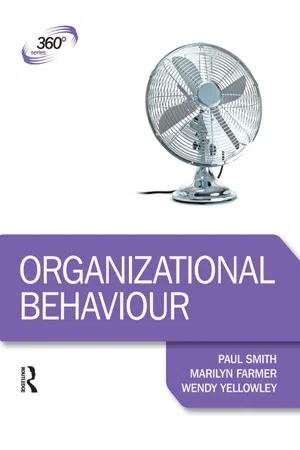![]()
1 | Organization behaviour: an introduction |
The only thing worse than slavishly following management theory is ignoring it completely. THE ECONOMIST (1994)
The 20th century was the age of the machine; the 21st century will be the age of people. ROSABETH MOSS KANTER (1989)
CHAPTER OUTLINE
1 Introduction: the meaning of organizational behaviour
2 Differing perspectives on organizational behaviour
3 Theory and practice in organizational behaviour
4 Levels of organizational behaviour
5 The employment relationship
6 Summary
CHAPTER OBJECTIVES
By the end of this chapter you will understand:
• definitions and meanings of organizational behaviour and the importance of the subject
• how to evaluate different perspectives on organizational behaviour
• the application of theory to practice in organizational behaviour
• the main levels of organizational behaviour
• the employment relationship.
1.1 Introduction: the meaning of organizational behaviour
Organizational behaviour (OB) is a popular subject on many business school degree programmes. It is also taught on a wide range of business and management postgraduate programmes and courses aimed at the practising manager. Yet organizations do not have ‘organizational behaviour departments’ in the same way that they have marketing, HR or accounting departments. What is OB? What does the subject cover? And why might it be considered important? These are some of the questions that will be considered in this chapter, and in the rest of the book.
OB can be defined in terms of the study of individuals and groups in organizations. As the second word suggests, one of its principal concerns is behaviour, of individuals and of groups, while the first word suggests that it also has something to do with the study of organizations. Thus, as a starting point, it can be suggested that OB is concerned with the behaviour of individuals and groups in an organizational context. For this, an understanding of psychology will be important.
KEY TERM | Organizational behaviour (OB): can be defined in various ways, but, in general, OB is concerned with the behaviour of individuals and groups in an organizational context. |
Exploring the organizational part of the term a bit further, OB is also concerned with how organizations are designed and structured, and how they function. Organizations will also be influenced by the external environment or context in which they operate. So here, some understanding of sociology will undoubtedly be important, and of organizational studies, politics and economics.
Combining the elements, however, reminds us that each will have an influence on the other: thus, how organizations are designed and run will affect individuals and groups within them, while, of course, ‘organizations’ themselves and how they are run are an outcome of individuals and groups of individuals.
ACTIVITY | Definitions and meanings Here are a number of, and views about, OB: that aspect of theory and practice concerned with the behaviour of individuals and groups in organizational contexts(MARTIN AND FELLENZ 2010: 14) the study of the structure, functioning and performance of organizations, and the behaviour of groups and individuals within them(PUGH 1971: 9) the study and understanding of individual and group behaviour and patterns of structure in order to help improve organizational performance and effectiveness(MULLINS 2010: 3) a field of study that investigates the impact that individuals, groups, and structure have on behaviour within organizations for the purpose of applying such knowledge toward improving an organization's effectiveness( ROBBINS et al. 2010: 7) a multidisciplinary field of enquiry, concerned with the systematic study of formal organizations, the behaviour of people within organizations, and important features of the social context, that structures all the activities that occur inside the organization( BRATTON et al. 2010: 9) in leading textbooks, OB tends to be presented as largely cut-and-dried and settled, thus lacking any controversy, conflict or contest, yet such appearances are deceptive. There are fundamental differences of view – cultural, political and ethical – about how organizations are organized, how they should be organized and how they can be studied. To some extent, these mirror and amplify differences of opinion and preference among people working in organizations (between factions of senior managers for example) about how to organize and manage their operation.(KNIGHTS AND WILLMOTT 2007: 13) |
| Q What are the similarities between the different definitions of OB outlined above? And how do they differ? Consider these views. |
The importance of organizational behaviour
The definitions in the case study remind us to consider what the study of OB is for – that is, what is our purpose? For example, one purpose could be simply to improve our understanding: of ourselves and our behaviour, and that of others, and of organizations – that is, knowledge for knowledge's sake. Another would be to enable people to be better managers, and a related one would be to improve organizational effectiveness – that is, to enable organizations to run better. Lastly, it could be in order to improve understanding, not just for its own sake, but to challenge how things are perceived and done now – that is, the status quo – and to try to bring about change.
Reflective question
Why might an understanding of OB be considered of relevance to the practising manager?
1.2 Differing perspectives on organizational behaviour
People have differing views on a whole host of areas: politics and how best to run the country, art, sport, and so on, and they are often keen to express these – for example, on Internet blogs and networking sites, in letters to newspapers, on TV chat shows and on talk radio. It is no different in OB. If we look at the definitions of OB by the different authors in the case study in Section 1.1, we can see this: the first one stresses the behaviour of individuals and groups, and suggests a more psychological perspective. In the second, the stress is more on organizations and their structure and functioning, which could perhaps be termed an organizational perspective. The next two highlight organizational effectiveness and a more managerial perspective. Bratton et al.’s definition points to the multidisciplinary nature of the subject and emphasizes the social context – that is, a more sociological perspective; this and the last definition also adopt a more critical view.
One way that academics, managers and consultants can express their views is to write textbooks or articles. Of course, any one textbook does not have to adopt a single perspective to the exclusion of all others; many OB books are both multidisciplinary and cover multiple perspectives, as this one attempts to do. Similarly, just because a particular book takes a more psychological perspective on the subject, or a critical one, does not mean that it cannot also aim to be useful to the practising manager. It is just that books taking a more managerial perspective have a tendency towards seeing various approaches towards the management of employees, or the interaction between different managers or departments, as relatively unproblematic, while more critical perspectives point out that management decisions may be contested by employees and representative bodies such as trade unions, or that different managers may fight for political influence. Books written from this p...

















